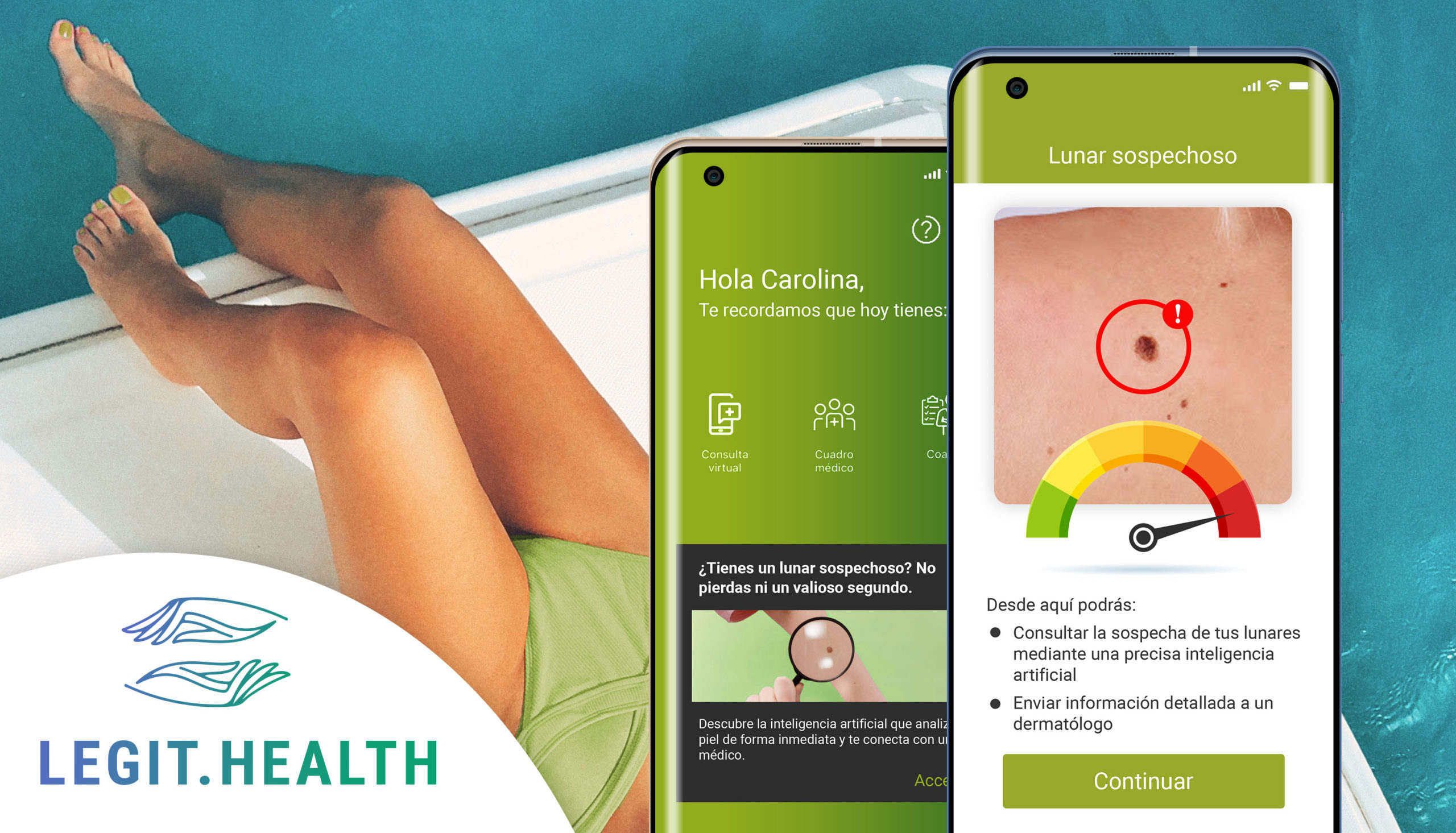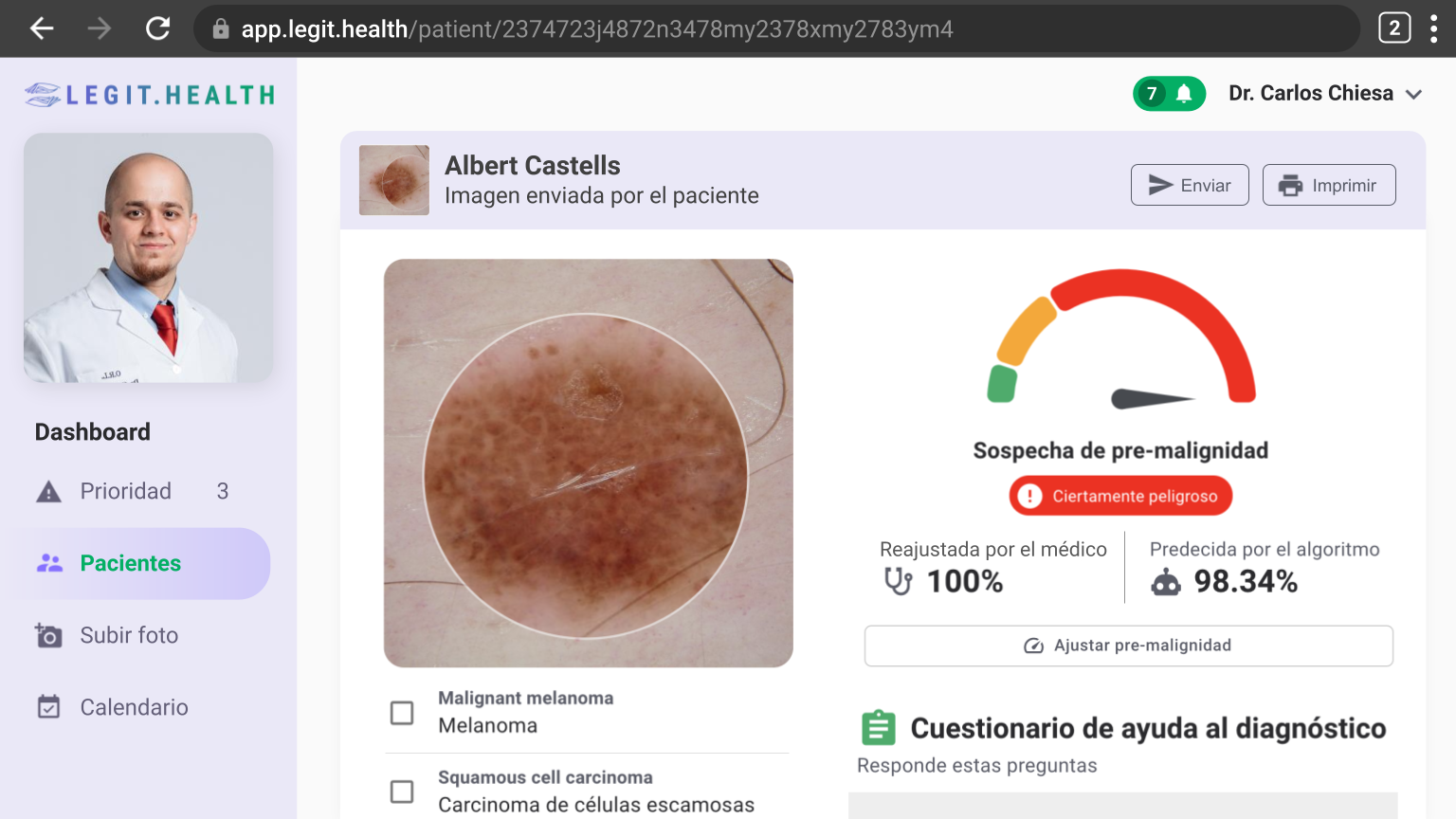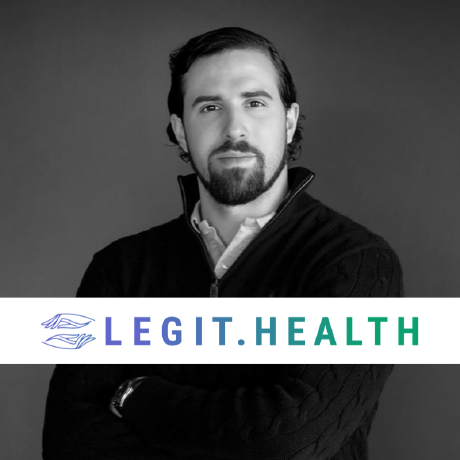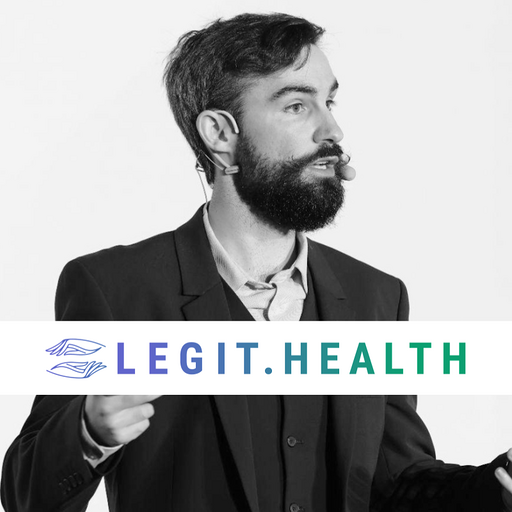Pre-malignancy: detect skin cancer before it becomes a problem.
Introduction
The future of skin cancer prevention has arrived thanks to Legit.Health's revolutionary pre-malignancy estimation tool.
Legit.Health has developed a clinically validated tool that processes smartphone images and automatically analyses them, utilizing the criteria of the top doctors in this field and calculating the pre-malignancy suspicion of any lesion.
All the advantages of cutting-edge technology and the processing power of deep learning algorithms are put in the hands of Next-Generation Doctors who want to prevent skin cancer.
Prevention should not consist on catching skin cancer before it kills you. Prevention should also catch a skin cancer before it's even skin cancer.
Skin cancer: common, lethal, ignored
In a world where sunbathing and the use of tanning products and treatments have become widespread, the risk of skin-related diseases such as Keratinocyte cancer (which represents 95% of malignant skin tumours) is higher than ever.
Cutaneous malignancies are the most frequent type of cancer in the world, with over 2 million people affected yearly.
Additionally, the excessive workload that doctors face in healthcare systems across the world and the lack of awareness from patients only exacerbate the problem, as many doctors manually analyse harmless moles and many patients fail to identify harmful lesions and let them develop for much longer before seeking medical help.
Preventive medicine saves lives
The power behind early detection and preventive medicine is well known within the field of oncology and is a reality of the day-to-day practice of any Next-Generation Doctor.
Prevention has become an important way to manage keratinocyte cancer, so it is important to assess the effectiveness of methods used to prevent keratinocyte cancer in the general population.
Preventive action can only happen if the doctor has access to two key things: 1) adequate resources and 2) a good screening process. This is especially true in situations where a lesion that is not malignant in the present moment could become malignant in the near future, a situation known as pre-malignancy.
Biopsies should not be prescribed lightly, so most cutting-edge doctors have come to rely on specialized tools to assist their diagnosis. Thus, having access to the adequate tools to help doctors make the diagnosis and take the appropriate steps to determine the nature of the disease is key.
Among these tools, artificial intelligence is the most used and most rapidly evolving. Many companies focus on diagnosis, but Legit.Health is leading preventive action with the pre-malignancy suspicion artificial intelligence. In other words, Legit.Health's algorithms not only tell you if the lesion is currently malignant but also give you the value that reflects the algorithm's suspicion of the lesion becoming malignant at some stage.
Case study: DKV health insurance
Since 2021, doctors that care for patients in partnership with the Spanish insurance company DKV, are benefiting from Legit.Health's pre-malignancy suspicion technology. This grants doctors a high-quality triage of patients that allows them to care for patients better, and it also helps doctors in the process of helping patients understand what are the risks.

Legit.Health joins DKV to prevent the rise of skin cancer on Spanish beaches with Artificial Intelligence
With an accuracy of 93,23%, the skin-diagnosis technology developed by Legit.Health detects melanoma just by looking at smartphone images.
Using what is already known as "virtual dermatology", DKV offers, through the app Quiero cuidarme Más, all health services digitally on the phone. In short: it's an app that allows you to upload photos and virtually visit a dermatologist.
The future of AI-asisted prevention is Legit.Health
Legit.Health is the revolutionary Clinical Data and Communication tool for Next-generation dermatologists that triples the empowerment of patients.
The purpose of deep learning algorithms used in Legit.Health is to help doctors make an informed decision, putting all the processing power and stored data of a cutting-edge computation at the service of the physician's performance.
Legit.Health's algorithms automatically grade lesions just by looking at smartphone images and small patient-reported outcome measures (PROMs). In other words: the tool will automatically fill in most of the dermatology scoring systems, such as PASI, SCORAD, UAS, as well as estimate the pre-malignancy of any lession.
How does this revolutionary tool for next-generation doctors work?
Enables early detecion
As hard as it might be, early detection is in the hands of the patients. They are the ones who know their body better and the ones who have access to it on a day-to-day basis. Sadly, they usually lack the knowledge and expertise to identify what's truly worrisome, so communication between doctor and patient is one of the most important parts of the diagnosis process.
Legit.Health empowers the patient to become an active participant in their treatment starting on the early detection phase, enabling them to take a simple smartphone picture and automatically send them through the app to their doctors in mere seconds.
Regardless of the disease presenting malignancy, pre-malignancy or falling within another category, the deep learning algorithms are able to discern between 232 different skin pathologies, so whatever is happening to them, the users can be sure that the app will be able to help their doctor identify the problem.
A precise pre-malignancy estimation
Using deep learning computer vision algorithms trained with thousands of images and the input of top doctors in their field, this tool is capable to give the doctor the five most probable diseases with a margin of error of only 12%.
Legit.Health's revolutionary solution not only is able to detect and identify the most common malignant lesions such as malignant melanoma, basal cell carcinoma, squamous cell carcinoma, intraepidermal carcinoma and more but can detect and categorize most diseases with a pre-malignancy diagnosis like Keratoacanthoma, Actinic keratosis or been Atypical Nevis.
This means that both primary attention doctors and specialists will have, at hand reach, the curated second opinion of dozens of specialists on the field.
Easy to use
Any tool that relies on the doctors and the patients gave it a propper use needs to be easy to use and understand.
Thanks to the revolutionary deep learning algorithm developed by Legit.Health and the design of its interface the patient only needs to take a picture of the affected area with their smartphone and its automatically sent to the doctor for further analysis.
This picture is analyzed by the clinically validated algorithm and its results are sent to the doctor, which benefits not only from the consistency of the data generated by this process but makes much easier the job of monitoring the development of a lesion showing pre-malignancy.
After all, communication between the doctor and the patient is one of the cornerstones of medicine, and it should be easy.
Image of pre malignancy prediction with artificial intelligence
A precise and reliable tool
Legit.Health's tool analyzes the pathologies using a validated scoring system that has both the lowest MID (Minimal important Difference) and is sensible to the lowest LDC (Lowest Detectable Change), which means the algorithm analyzes every image with more precision and attention to detail than any human observer would.
Furthermore, it has a higher validity and reliability while maintaining comparable clinimetric properties, thanks to the intrinsic functioning of computer vision algorithms.
In conclusion
The revolutionary tool developed by Legit.Health will change how we approach the early diagnosis of skin cancer, empowering the patient to report their symptoms earlier than ever, allowing doctors an easy method of screening and triage, and enabling smooth communication between both of them.
Thanks to Legit.Health, doctors across the globe can improve their correct diagnosis rate by 23% and make treatment easier to follow for the patient by making them active participants in their own recovery.
There is no denying that the use of algorithms that estimate the severity of the disease represents a bright future for the practice of dermatology and that will, without doubt, help advance the field.
Get access now
This free 23-day trial of Legit.Health gives clinics and hospitals a hands-on look at how to drive increased adherence and improve patient outcomes, as well as improving efficiency and overall quality of life.

